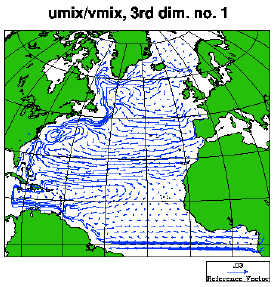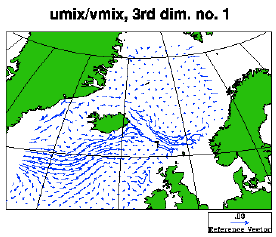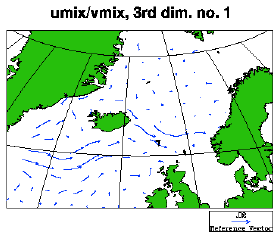shell scripts:
vector.sh
Syntax
Example 1:
Mixed layer currents
The figure below was made by issuing the command:
vector.sh 3dmap hycom_031_uv.nc umix vmix 1

Example 2:
As example 1, but zooming in
The next figure was made by issuing the same command as in Example 1, after the file userdef.ncl was copied from /home/arnem/lib/ncl-metno/ , with the contents of four lines changed to
x1= nx-50 ; Leftmost grid point to depict, for dimension x or lon x2= nx ; Rightmost grid point to depict y1= ny-40 ; Lowermost grid point to depict, for dimension y or lat y2= ny ; Uppermost grid point to depict
in order to zoom in on a sub-domain.

Example 3:
As example 2, but with a modified specification for
displaying vectors
The figure below was made by issuing the same command as in Example 1 and 2, after the file userdef.ncl was copied from /home/arnem/lib/ncl-metno/ , with the same changes as in Example 2 above, and additional changes of four other lines to
vsz= 0.05 ; Size (length) of reference vector vsp= 0.02 ; Speed of reference vector vd = 0.04 ; Distance between vectors curly_on= 1 ; =1: Use curly vectors, otherwise, use standard vectors
This causes fewer and shorter vectors to be displayed, when compared to Example 2:

vector.sh: syntax
vector.sh --help
vector.sh / ncl-metno 1.2
>>>
>>>
>>> Syntax:
>>> =======
>>>
>>> vector.sh <option> <file> <u> <v> [<d3node> (<d4node>)]
>>> where
>>> <option> specifies dimensions and geo- or nongeo-grid
>>> implemented:
>>> [234]d - [234]D fields
>>> [234]dmap - [234]D fields, dims. are lon & lat
>>> ...[234]dmap will be displayed on a geogr. map
>>> <file> name of the netcdf file
>>> <u> name of variable w/ velocity in the x-direction
>>> on the netcdf file (case sensitive)
>>> <v> name of variable w/ velocity in the y-direction
>>> on the netcdf file (case sensitive)
>>> <d3node> node no. of third dimension
>>> if <option> is one of 2d, 2dmap and a fourth
>>> argument is present, or if <d3node> is negative,
>>> this will be interpreted as a flag that will cause
>>> the ncl script to remain (see examples below)
>>> <d4node> node no. of fourth dimension
>>>
>>> The script will produce an eps-file and a png-file.
>>>
>>>
>>> User specifications:
>>> ====================
>>>
>>> By copying the default spec.s from
>>> /home/arnem/lib/ncl-metno/userdef.ncl
>>> to the directory where the command 'vector.sh' is given,
>>> the user may specify
>>> * title
>>> * font
>>> * zooming
>>> * vector spec.s (size, distance, curly/regular vectors)
>>> * plot size limits
>>> for geographical maps:
>>> * names of longitude & latitude variables
>>> * map projection
>>> * coastline detail level
>>> (look up, or copy, this file to edit your own 'userdef' file).
>>>
>>>
>>> Examples:
>>> =========
>>>
>>> vector.sh 4dmap hydrography.nc u v 1 10
>>> will produce vectors on a lon-lat grid w/ a map, for
>>> the first node in the third dimension (usually the top
>>> vertical level) and the tenth node in the fourth
>>> dimension (usually time step no. 10), based on
>>> variables 'u' and 'v' on the file 'hydrography.nc'
>>> vector.sh 3d surface.nc u-vel v-vel -1
>>> will produce vectors on a x-y grid of the first node
>>> in the third dimension, based on variables 'u-vel' and
>>> 'v-vel' on the file 'surface.nc'; and the ncl-script
>>> will be retained
>>> vector.sh 2dmap topography.nc ubaro vbaro a
>>> will produce vectors on a lon-lat grid w/ a map,
>>> based on variables 'ubaro' and vbaro' on the file
>>> 'topography.nc'; and the ncl-script will be retained
>>>
>>>
>>> Terminating.